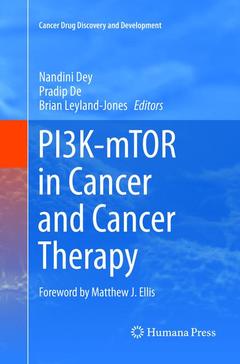Description
PI3K-mTOR in Cancer and Cancer Therapy, Softcover reprint of the original 1st ed. 2016
Cancer Drug Discovery and Development Series
Coordinators: Dey Nandini, De Pradip, Leyland-Jones Brian
Language: English
Subject for PI3K-mTOR in Cancer and Cancer Therapy:
Publication date: 05-2018
Support: Print on demand
Publication date: 06-2016
Support: Print on demand
Description
/li>Contents
/li>Biography
/li>Comment
/li>
Nandini Dey, M.S., Ph.D., is a Senior Scientist Head of Cancer Biology, Avera Cancer Institute Center for Precision Oncology. She is also Assistant Professor of the Department of Internal Medicine at The University of South Dakota Sanford School of Medicine. Dey has more than 20 years of experience in translational research and has authored or co-authored more than 80 publications.<
Pradip De, M.S., Ph.D., is a Senior Scientist Head of Translational Oncology, Avera Cancer Institute Center for Precision Oncology. He is also Assistant Professor of the Department of Internal Medicine at The University of South Dakota Sanford School of Medicine. De has more than 20 years of experience in translational research in academics and industry and has authored or co-authored more than 90 publications.
Brian Leyland-Jones, MB BS, Ph.D. is Vice President of Avera Cancer Institute Center for Precision Oncology. Dr. Leyland-Jones is a consulting professor at the Stanford University School of Medicine. He is an internationally renowned breast cancer expert with more than 35 years experience in patient care and research, has published over 170 papers and has received over 11,000 citations in his scientific career.
Provides a comprehensive review of recent developments made in the basic science and the exciting new therapeutic strategies of the PI3K-mTOR pathway-related signal transduction
Examines the contribution of the PI3K-AKT-mTOR signaling pathway towards the development and the progression of human tumors
Includes two complementary sections which address the problem of etiology and disease progression?
Includes supplementary material: sn.pub/extras




